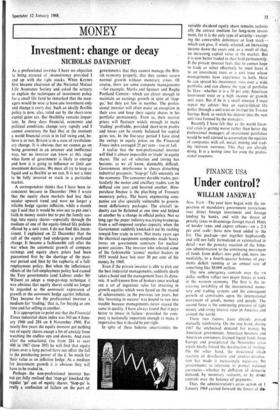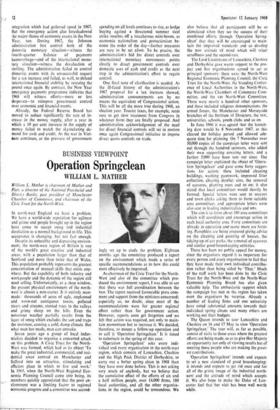Under control?
FINANCE USA WILLIAM JANE WAY
New York—The year here began with the im- position of mandatory government restrictions over direct foreign investment and foreign lending by banks, and with the threat of penalty taxes to discourage foreign travel. Hints of border taxes and export rebates—on a 2-3 per cent scale—have now been added to the list. This package—put together haphazardly and still not fully formulated or rationalised in detail—was the panicky reaction of the John- son administration to the continuing movement of funds from -dollars into gold and, more im- mediately, to a fourth-quarter balance of pay- ments deficit running at an annual rate of something like $8,000 million.
The new emergency controls over the us dollar outflow reflect two major forces at work in the western economy. The first is the in- creasing instability of the international mone- tary and trading systems and the consequent growth of constraints upon the international movement of goods, money and people. The second force is the continuing pressure of tight money and rising interest rates in America and around the world.
These two factors have already proved mutually reinforcing. On the one hand, during 1967 the unchecked demand for money by American government, American business and American consumers drained liquid funds from Europe and precipitated the November crisis which finally forced the devaluation of sterling. On the other hand, the threatened chain reaction of devaluation and counter-devalua- tion has made it increasingly necessary for governments to intervene to protect national currencies—whether by deflation of domestic demand, by monetary restraint, or by direct controls over the balance of payments.
Thus, the administration's crisis action of 1 January 1968 carried forward the forces of di* integration which had gathered speed in '1967. But the emergency action also foreshadowed the major theme of economic events in the New Year, too. During 1967, the Johnson administration lost control both of the domestic monetary situation—witness the fourth-quarter balance of payments haemorrhage—and of the international mone- tary situation—witness the devaluation of sterling. The administration failed to control domestic events with its unsuccessful request for a tax increase and failed, as well, to defend international financial stability by rescuing the pound once again. By contrast, the New Year emergency payments programme indicates that 1968 will witness efforts—more or less desperate—to reimpose government control over economic and financial events.
Already, the Federal Reserve Board has moved to reduce significantly the rate of in- crease in the money supply, after a year in which a 10 per cent increase in the supply of money failed to match the skyrocketing de- mand for cash and credit. As the war in Viet- nam continues, as the pressure of government spending on all levels continues to rise, as hedge buying against a threatened summer steel strike touches off a treacherous mini-boom, as economic nationalism and protectionism be- come the order of the day—further measures are sure to be set afoot. To be precise, the administration's bid for direct controls over international monetary movements points clearly to direct government controls over domestic uses of cash and credit as the next step in the administration's effort to regain control.
One final note of clarification is needed. As the ill-fated history of the administration's 1967 proposal for a tax increase showed, administration announcements are by no means the equivalent of Congressional action. This will be all the more true during 1968, an election year. Tourist taxes, for example, seem sure to get slow, treatment from Congress in whatever form they are finally proposed. And administration acknowledgement of the need for direct financial controls will set in motion once again Congressional initiative to impose direct quota controls on trade.































 Previous page
Previous page